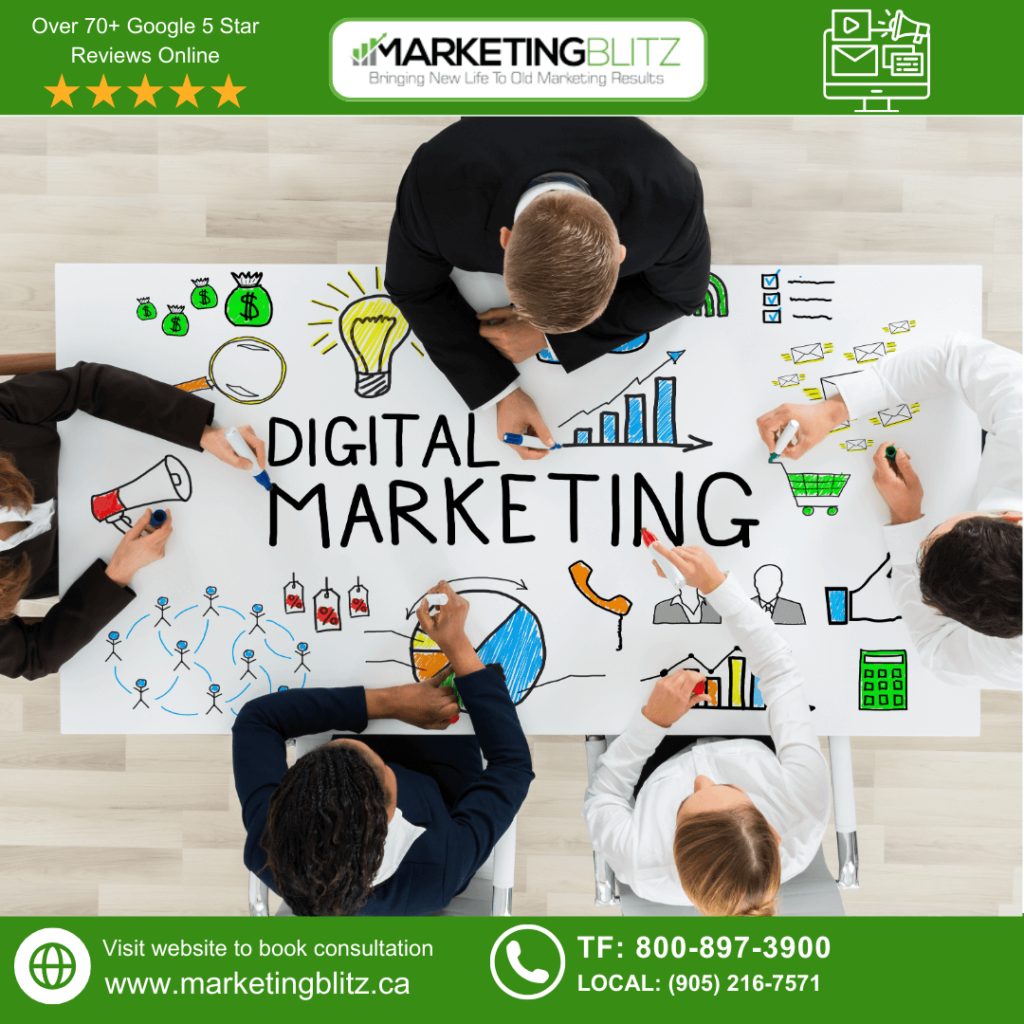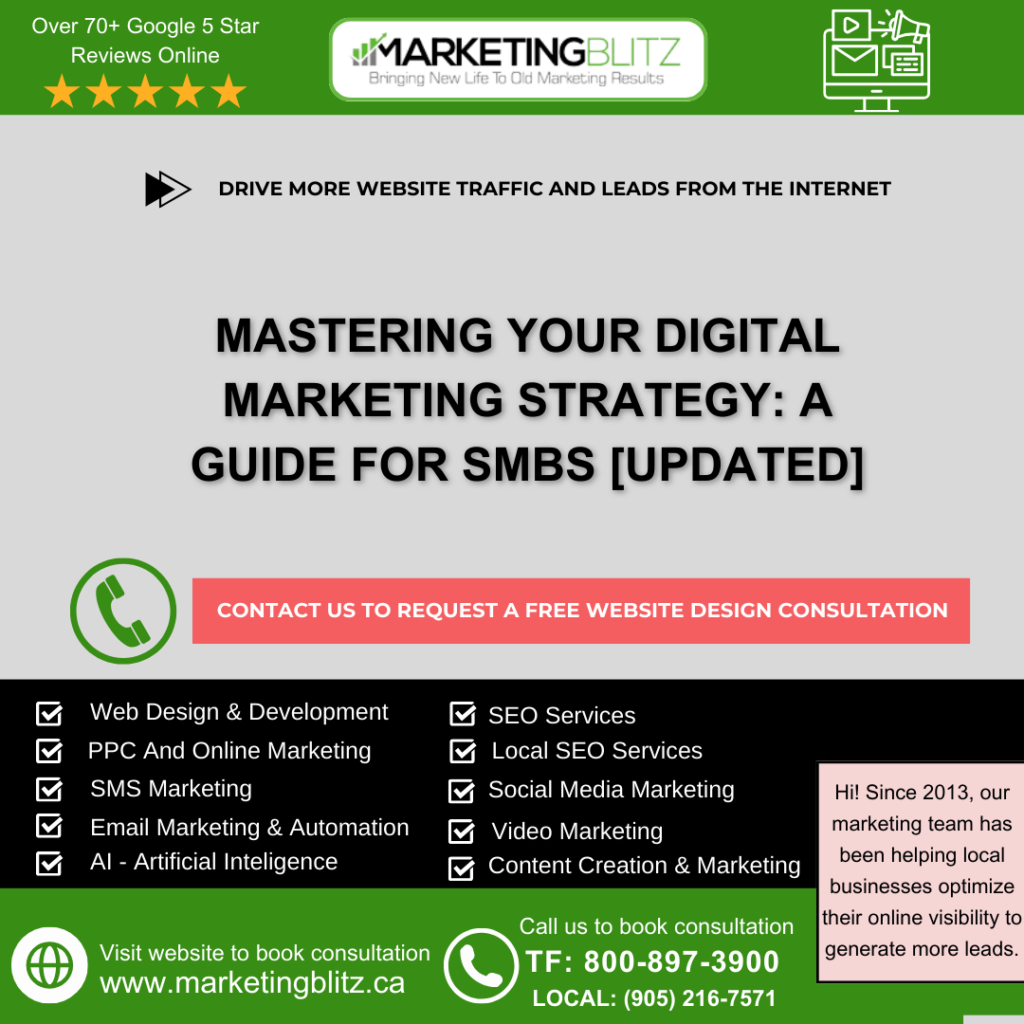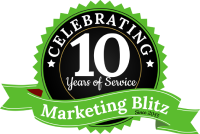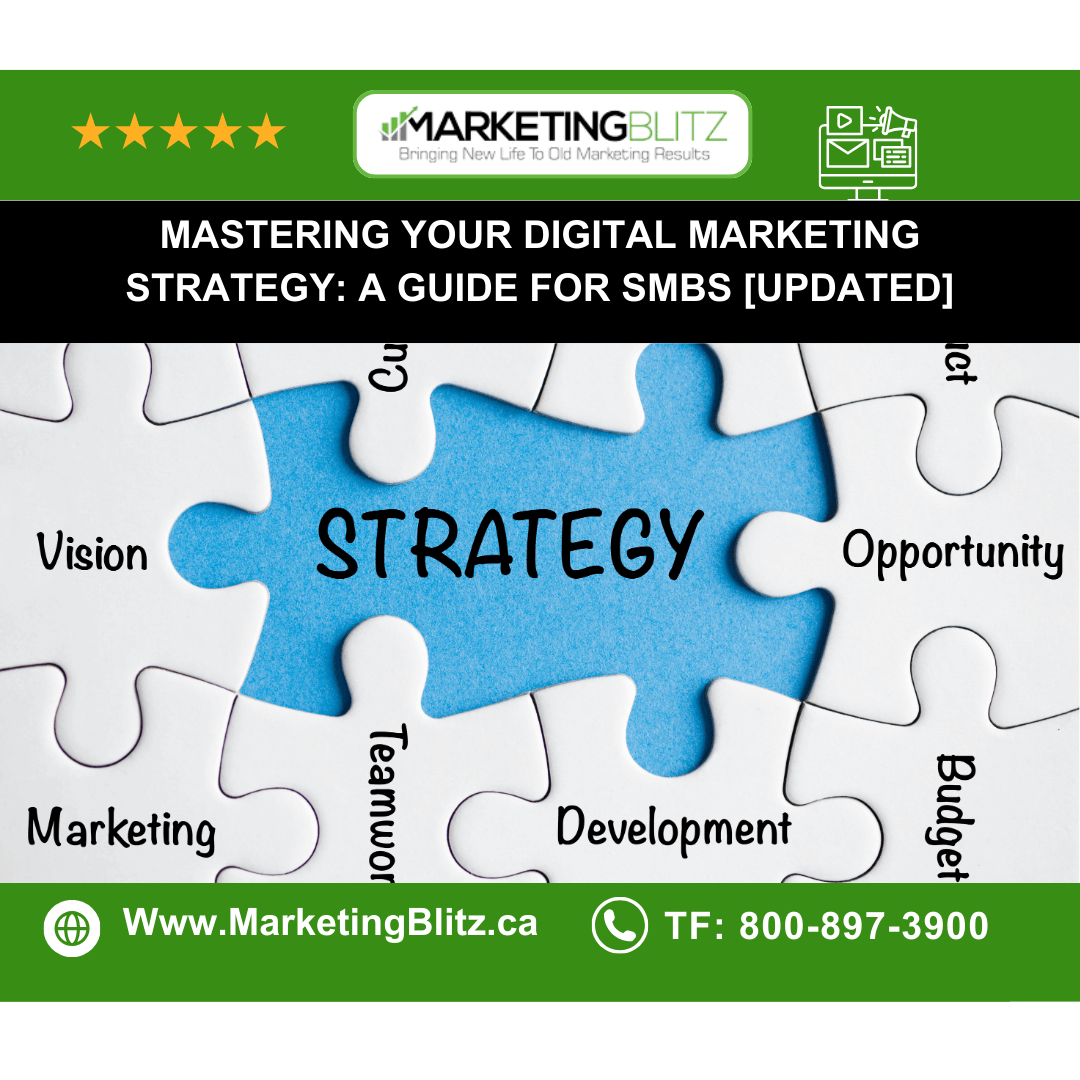Mastering Your Digital Marketing Strategy: A Guide for SMBs [Updated 2024]
Are you struggling to make sense of digital marketing? You’re not alone. Many small and mid-size businesses find it difficult to keep up with online marketing trends. But without a solid digital marketing strategy, you’re missing out on a huge opportunity to boost your business. Understanding what works best for your brand isn’t just a nice-to-have; it’s a must-have if you aim to drive growth and engagement.
Digital marketing isn’t about having a flashy website or social media presence. It’s about crafting a strategy that includes SEO, content marketing, and more. This is crucial for attracting the right audience and turning views into customers. If you’re serious about leveling up your business, it’s time to rethink your approach. For those ready to see what a true digital marketing strategy can do, contact Marketing Blitz. This Brampton-based agency offers a free consultation and audit of your online presence and SEO visibility. Make the move today and see your business thrive.
Are you a dentist looking to grow your practice with a proven digital marketing strategy? Explore our tailored dental marketing services designed to enhance your online presence and attract more patient inquiries. Dental Marketing Experts to learn more!
Understanding Digital Marketing Strategy
To thrive in today’s connected and competitive local business environment, having a solid digital marketing strategy is key for small and mid-size businesses. It’s like having a well-mapped route to guide you through the bustling streets of the internet, ensuring you reach your audience effectively and efficiently.
What is Digital Marketing?
Digital marketing is promoting products or services using digital channels. These channels include search engines, social media, email, Google Business Profile and websites. Imagine having a shop open 24/7, reaching people across the globe. That’s the power of digital marketing. It’s not just about setting up a website or posting random social media updates. It’s a blend of creativity and data. The key components include:
- SEO (Search Engine Optimization): Helps your business get noticed on search engines like Google.
- Content Marketing: Engaging the audience with valuable content that informs or entertains.
- Social Media Marketing: Building a community and promoting your brand through platforms like Facebook, Instagram, or LinkedIn.
- Email Marketing: Reaching customers directly with personalized messages.
The Role of a Digital Marketing Strategist
Think of a digital marketing strategist as the pilot navigating your marketing plane. Their role is to craft and steer the strategy, ensuring the business meets its goals. Essential responsibilities and skills include:
- Research and Analysis:
- Understanding market trends and customer needs.
- Using data to refine tactics and improve results.
- Strategic Planning:
- Aligning marketing goals with business objectives.
- Developing campaigns that capture the brand’s voice.
- Execution and Management:
- Overseeing content creation, advertisement placements, and social media engagement.
- Ensuring each campaign is cohesive and effective.
- Evaluation and Adjustment:
- Monitoring campaign outcomes and adjusting as needed.
- Keeping pace with digital advances and competitors.
Are you ready to elevate your presence with a tailor-made digital marketing strategy? Contact Marketing Blitz, a Digital Marketing Strategy Agency based in Brampton, for a free consultation and audit of your online presence and SEO visibility.

Essential Elements of a Digital Marketing Strategy
Crafting a digital marketing strategy is like constructing a solid building. Each part plays a crucial role in ensuring stability and growth. Let’s break down the key elements that form this foundation, essential for small to mid-size businesses aiming to thrive online.
Market Research and Audience Analysis
Imagine trying to hit a target blindfolded. That’s what marketing is like without proper research. Knowing your audience is crucial. By understanding who your customers are, what they like, and where they spend their time online, you can tailor your message to meet their needs.
- Surveys and Questionnaires: Gather insights directly from your audience.
- Social Media Listening: Monitor trends and conversations to see what your audience cares about.
- Competitor Analysis: Study competitors to identify gaps and opportunities.
Engage with your audience. Ask yourself: who are they and what problems do they need solving? The answers will guide your strategy.
Setting SMART Goals
Setting goals is like charting a map for your journey. Without clear directions, you might end up lost. SMART goals — Specific, Measurable, Achievable, Relevant, and Time-bound — give you a clear pathway to success.
- Specific: Define your goals clearly. Instead of saying “increase sales,” aim for “boost online sales by 20%.”
- Measurable: Use metrics to track progress. Numbers like website traffic and conversion rates are great measures.
- Achievable: Ensure your goal is realistic. Consider resources and constraints.
- Relevant: Align goals with your business objectives to ensure they matter.
- Time-bound: Set a timeline to add urgency and keep you focused.
With SMART goals, you set your digital marketing strategy on a clear path, making success a matter of time.
Budgeting for Digital Marketing
Just like you wouldn’t go shopping without a spending plan, you shouldn’t dive into digital marketing without a budget. Allocating funds wisely ensures you get the most value from your efforts.
Here are some tips:
- Prioritize Channels: Invest more in platforms that show the best return on investment.
- Allocate for Testing: Keep a portion aside for experimenting with new strategies or channels.
- Review and Adjust: Regularly assess spending and adjust based on performance.
Remember, a well-planned budget prevents overspending while maximizing your strategy’s reach.
If you’re feeling overwhelmed or need expert guidance, reach out to Marketing Blitz, a Digital Marketing Agency based in Brampton. They offer a free consultation and audit of your online presence and SEO visibility to keep you on the right track.
Channels of Digital Marketing
In today’s competitive market, a well-rounded digital marketing strategy is crucial for small and mid-sized businesses. Choosing the right channels can make the difference between being seen and being forgotten. Don’t know where to start? Let’s explore some key channels you can use to boost your brand.
Social Media Marketing
Social media platforms have become the go-to for connecting with potential customers. They’re not just about cute cat pictures anymore—they’re a powerful marketing tool:
- Facebook: Great for engaging a broad audience with diverse content—from posts to live videos.
- Instagram: Perfect for visually-focused brands that want to showcase their products via images and stories.
- LinkedIn: If you’re in the B2B space, LinkedIn offers opportunities to connect with professionals and industry leaders.
Using social media in your digital marketing strategy isn’t just about posting content. It’s about creating a community, listening to feedback, and building relationships. Are you engaging with your audience, or just talking at them?
Email Marketing
Email marketing is the unsung hero of digital strategies. It’s personal, direct, and when used right, incredibly effective for nurturing leads and keeping existing customers in the fold.
- Personalization: Tailor emails to the interests and behaviors of each subscriber.
- Automation: Send timely emails without manual input—think welcome series, follow-ups, or cart reminders.
- Segmentation: Group your audience based on age, location, purchase history, etc., for better-targeted campaigns.
By consistently showing up in your customers’ inboxes with value-driven content, you can stay top-of-mind. Are your emails offering something readers can’t resist?
Content Marketing
Content is more than king—it’s the entire kingdom when it comes to driving engagement and SEO. Effective content marketing pulls people in and keeps them there.
- Blogs: Share insights, tips, and news in your industry to establish your brand as a thought leader.
- Videos: Capture attention quickly and convey complex information in an easy-to-digest format.
- Infographics: Break down data and statistics in a visually compelling way.
Not just about churning out content—it’s about delivering valuable, relevant information. Is your content drawing people in like a magnet, or just filling space?
By harnessing these channels, you’ll be better equipped to develop a digital marketing strategy that elevates your brand’s presence online. Eager to know more or need a helping hand? Contact Marketing Blitz, a digital marketing agency in Brampton, for a free consultation and audit of your online presence and SEO visibility.

Digital Marketing Strategy & Implementation
In the fast-paced world of online business, having a robust digital marketing strategy is crucial. It’s not just about being present online; it’s about making impactful moves that resonate with your audience. But how can small and mid-size businesses efficiently implement such strategies? Two essential components are creating a content calendar and monitoring analytics. Let’s explore how these tools can transform your marketing efforts.
Creating a Content Calendar
Imagine trying to juggle without a rhythm. It’s hectic, right? A content calendar brings that much-needed rhythm to your marketing efforts. It’s not just a plan—it’s your map to success.
A content calendar helps you:
- Organize Your Thoughts: Keep track of your ideas and ensure they’re aligned with your business goals.
- Plan Ahead: Schedule posts, campaigns, and promotions ahead of time, so you’re not caught off guard.
- Maintain Consistency: Ensure you’re consistently engaging with your audience, which builds trust over time.
By laying out your content in advance, you avoid last-minute scrambles, improve content quality, and align your messaging with key dates and events. A well-structured calendar is like having a trusty guide on a winding trail.
Monitoring and Analytics
Just like a pilot relies on instruments to navigate, businesses need analytics to steer their digital marketing strategy. It’s not enough to just set your strategy in motion; you have to measure how it’s performing.
Why is monitoring crucial?
- Understand Engagement: See which pieces of content hit the mark and which missed. This insight allows for real-time adjustments.
- Track Conversions: Follow the visitor’s journey from prospect to customer, identifying any hurdles along the way.
- Optimize Resources: Ensure you’re getting the most bang for your buck by assessing ROI on your marketing spend.
Use tools like Google Analytics, SEMrush, or HubSpot to gather data. These platforms provide valuable metrics such as page views, bounce rates, and conversion rates. By regularly reviewing these metrics, you can tweak your strategy to improve outcomes.
Don’t leave your digital marketing strategy to guesswork. Use these tools to make informed decisions. For more personalized advice, contact Marketing Blitz, a digital marketing agency based in Brampton, for a free consultation and audit of your online presence and SEO visibility.
Efficient implementation of these practices gives your business the structure and insight needed to thrive in the digital space.
Evaluating and Adjusting Your Strategy
You’ve set your digital marketing strategy in motion, but how do you know if it’s hitting the mark? The key is to regularly evaluate and adjust your approach. Just like a captain tweaks the sails based on the wind, you should tune your strategy to keep it aligned with your business goals. In this section, we’ll explore how evaluating key performance indicators (KPIs) and using A/B testing can unlock new levels of success for your business.
Key Performance Indicators (KPIs)
Measuring the effectiveness of your digital marketing strategy is crucial. But with so many metrics to consider, how do you choose the right ones? Start with key performance indicators, or KPIs. These are the silent heroes that tell you exactly how your strategy is performing.
- What are some KPIs you should monitor? Let’s break it down:
- Traffic Metrics: Keep an eye on website visits. Are they growing as expected?
- Engagement Rates: Track likes, shares, and comments. Is your audience interacting with your content?
- Conversion Rates: Measure the percentage of visitors who take a desired action. Are potential leads turning into actual customers?
- Bounce Rate: Check how many visitors leave after a single page. Are your pages relevant and engaging?
Understanding these metrics will help you see the big picture and pinpoint where improvements need to be made.
A/B Testing and Optimization
Ever wonder how small changes can make a big impact? This is where A/B testing comes into play. Imagine it like a taste test for your marketing strategy—you’re checking which flavor your audience prefers. By testing two versions of a page, ad, or piece of content, you gather valuable data on what works best.
- Here’s how to get started with A/B testing:
- Identify what to test: It could be email subject lines, ad images, or landing page layouts.
- Create two versions: Change one element in each version. Keep it simple so the results are clear.
- Split your audience: Show each version to a different group and compare outcomes.
- Analyze the results: See which version performed better and implement the winner.
By continually optimizing through A/B testing, you’re always refining your approach to meet audience needs better. It’s this cycle of testing and learning that keeps you ahead.
Remember, if you need help evaluating your strategy or conducting a marketing audit, consider reaching out to Marketing Blitz, a Digital Marketing Agency based in Brampton. They offer a free consultation and can provide insights into your online presence and SEO visibility.
With these tools in your arsenal, you’re well-equipped to adjust your sails and navigate your digital marketing journey with confidence.

Conclusion
Crafting a digital marketing strategy that stands out is crucial for small and mid-size businesses aiming to compete effectively. Start by focusing on core elements like understanding your audience, optimizing SEO, and leveraging social media. These strategies create a strong foundation for increased visibility and customer engagement.
Looking to the future, businesses must stay adaptable, ready to integrate emerging trends like AI-driven insights and personalized marketing. This adaptability will be key to staying relevant and ahead of your competitors.
For assistance in sharpening your digital marketing efforts, reach out to Marketing Blitz, a Brampton-based digital marketing agency. They offer a complimentary consultation and audit to evaluate your online presence and SEO performance.
Think about where your current strategy stands. What’s your next move to enhance it? Let us know your thoughts in the comments below.





